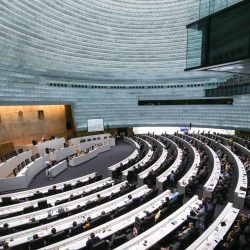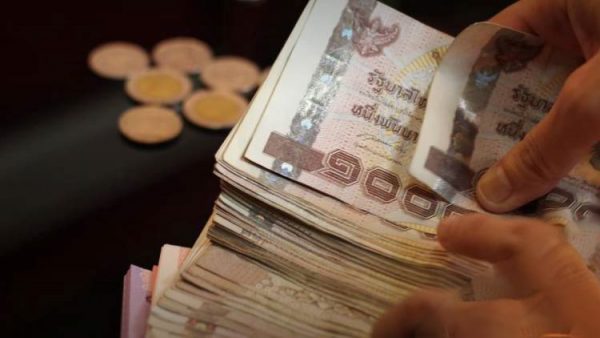A Pheu Thai-led government could revive talks with Cambodia on gas exploration
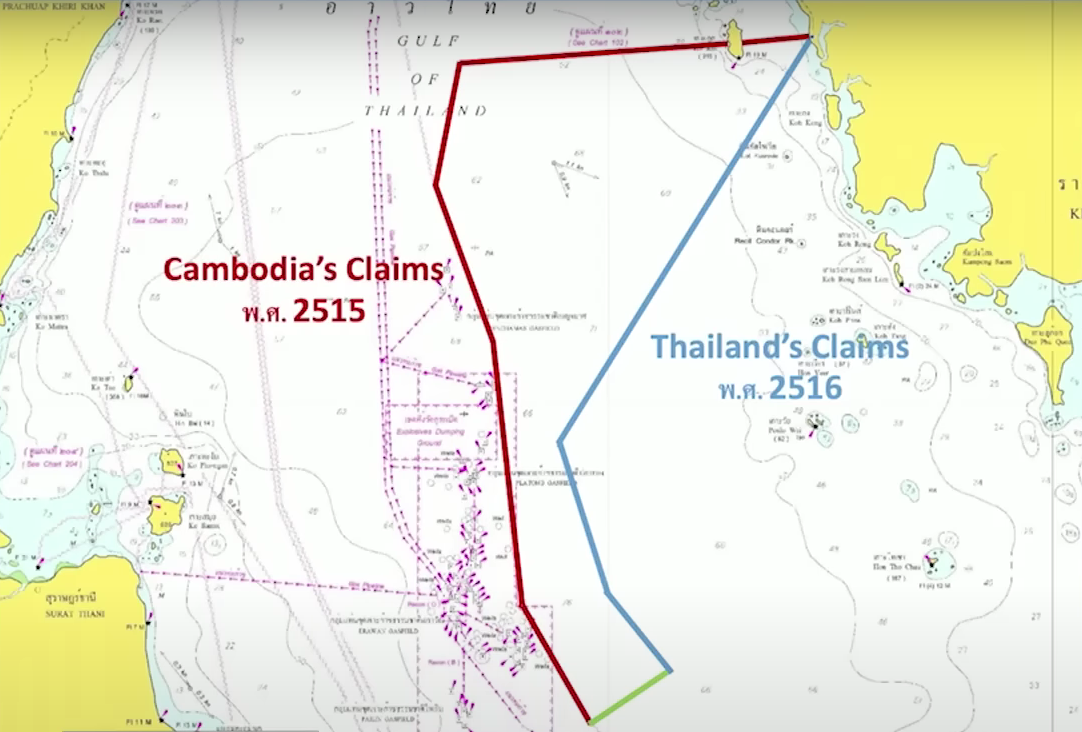
A good relationship with the Cambodian government would be a prerequisite for the resumption of negotiations on overlapping claims to natural gas resources in the Gulf of Thailand, experts said, but warned of a return to a cold conflict if there were mutual reservations.
The dividends of a diplomatic bonhomie would be high, as together they could exploit an estimated 1 trillion baht worth of energy resources.
Political turmoil and bruised nationalism, mostly in Thailand after the military coup in 2006, became a major impediment for progress in talks between the two countries on demarcating the disputed maritime boundaries as well as jointly developing petroleum reserves in the 26,000 square-kilometre area, they said.
The issue was discussed at length during a seminar on the overlapping claims of the two countries in the Gulf of Thailand. The event was jointly hosted by Chulalongkorn University’s Faculty of Law and the Foreign Ministry’s Treaties and Legal Affairs Department on August 10, even as the Thai side is still waiting for new guidelines and instructions from the yet-to-be-formed government.
The Thai Foreign Ministry has been preparing all the necessary material for the resumption of negotiations, said Suphanvasa Chotikajan Tang, director-general of the Treaties and Legal Affairs Department.
“We met our Cambodian counterparts early this year and will meet them again before the end of this fiscal year in September to get to know one another and get ready for the resumption of negotiations soon,” she said.
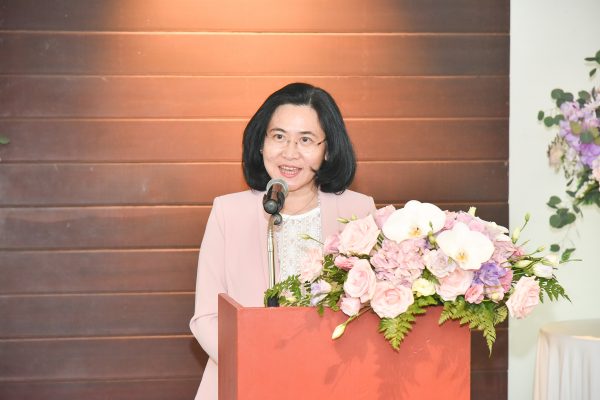
The Joint Technical Committee, currently chaired by caretaker Deputy Prime Minister Prawit Wongsuwan, would likely be changed. It would be required to propose a new negotiation framework and stance in accordance with the policy of the incoming government, she told the seminar.
Political shadow
Thailand and Cambodia had signed a memorandum of understanding (MOU) on the areas of their overlapping maritime claims to the continental shelf in June 2001, which became the starting point of negotiations. The two sides, however, were not able to make much progress since then due to political conflicts, mostly in Thailand.
Prior to the 2006 coup, the then government of prime minister Thaksin Shinawatra had managed to mark out the delimitation areas where they could undertake joint development. The talks were disrupted by the emergence of a strong anti-Thaksin movement, which accused him of having conflict of interest due to his business cronies and close relations with his Cambodian counterpart, Hun Sen.
The allegation was part of a broader bilateral dispute, as the establishment elite in Thailand opposed a Cambodian proposal to inscribe the Hindu temple of Preah Vihear as a UNESCO World Heritage Site. Heated rhetoric led to military clashes in 2008 and also to the interpretation of the 1962 judgment of the International Court of Justice over ownership of the archaeological site. There were more clashes between soldiers in 2011, inflicting casualties on both sides.
The 2001 MOU itself became a victim of the diplomatic troubles as the Thai government under Abhisit Vejjajiva wanted to terminate it in retaliation for Cambodia’s appointment of Thaksin as Prime Minister Hun Sen’s advisor in 2009. Thaksin was a fugitive at the time under Thai law, facing numerous corruption cases. The MOU, however, survived as the then Thai government failed to formally inform its Cambodian counterpart of its intention to do so.
Governments since then, including the ones led by Thaksin’s sister, Yingluck Shinawatra, and General Prayut Chan-o-cha, who staged a coup in 2014 to topple Yingluck’s administration, have failed to convince Cambodia to return to the negotiating table.
Energy shortage
Thailand can no longer afford the loss of economic opportunities to exploit natural resources in the areas of overlapping claims as the gas deposits on the Thai side of the gulf are about to run out, according to Kurujit Nakornthap, executive director of the Petroleum Institute of Thailand.
He told the seminar that the country was increasingly dependent on importing liquefied natural gas every year, with consequent pressure on electricity prices domestically. The price of imported gas is US$38.6 per million Btu (British thermal units) — seven times more expensive than the price of gas produced in the Gulf of Thailand, which is only US$5.5 per million Btu, he said.
“It is a necessity and an opportunity for us to resume the negotiations to jointly develop the petroleum resource in the overlapping areas,” he said.
Kurujit, a former permanent secretary at the Energy Ministry with experience in negotiations to establish joint development areas to exploit natural resources in the overlapping areas with Malaysia in the 1990s, suggested that patience and flexibility were badly needed for negotiations to make progress in such matters.
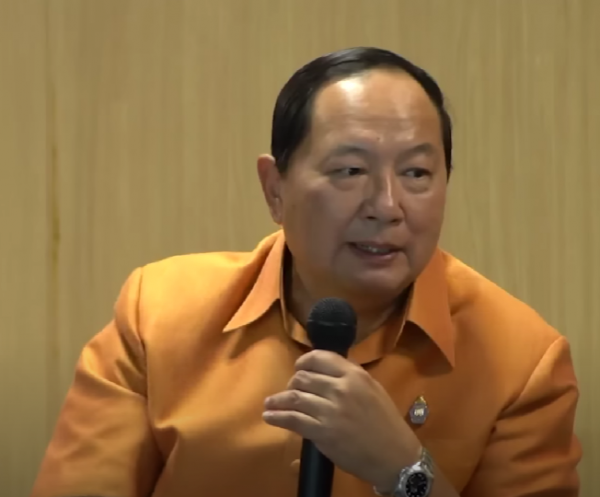
The Thailand-Malaysia joint development model was regarded as a success and stood out as a model for countries in the region, he said. “Both Thailand and Cambodia must drop their nationalism and rigid mindset and work towards seeking solutions for mutual benefit,” he said.
Beware of déjà vu
Dulyapak Preecharush, the deputy director of the Institute of East Asia Studies at Thammasat University, said the resumption of negotiations on the overlapping areas with Cambodia would be easier if Pheu Thai Party managed to form a new government as it has close connections with Hun Sen.
The Cambodian strongman of 40 years only recently transferred the reins of power to his son Hun Manet after a near-clean sweep in the July 23 election.
Thaksin and Yingluck were in the spotlight after they were seen attending Hun Sen’s 72nd birthday celebration in Cambodia recently. The close ties they enjoy with the leadership in the neighbouring country could also rub off on bilateral relations between the two countries, as well as the countries’ mutual economic interests.
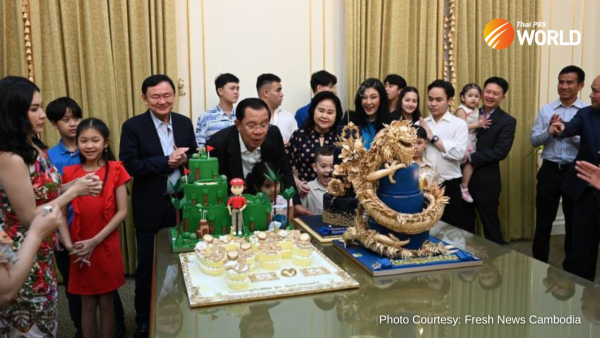
However, Dulyapak warned that the new government should be well aware of conflicts of national and personal interests when dealing with the joint development scheme with Cambodia. It could ignite a sense of déjà vu that could eventually jeopardize the negotiations on this matter, he said.
Watch : “MOU 2544” เจรจาไหล่ทวีปไทย-กัมพูชา | ทันโลก กับ Thai PBS
By Thai PBS World’s Regional Desk

